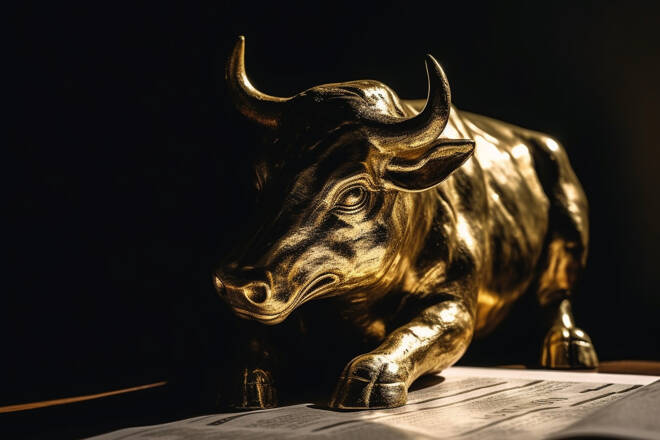Advertisement
Advertisement
Gold Prices Forecast: Will Safe-Haven Demand Continue to Drive Upward Trends?
By:
Key Points:
- Gold prices surge, marking best month since November 2022.
- Record high gold prices as central banks intensify purchases.
- Gold forecast remains bullish amidst global economic uncertainty.
Safe-Haven Demand and Rate Cut Expectations Drive Gold Up
Gold prices have seen a significant rise in March, positioning for their best month since November 2022. The combination of strong safe-haven demand, expectations of U.S. interest rate cuts, and substantial central bank buying have fueled this surge. XAU/USD has gained approximately 8%, marking a second consecutive quarterly increase. Everett Millman, chief market analyst at Gainesville Coins, notes the influence of ongoing global geopolitical tensions and trade uncertainties in driving investors towards gold.
Last week, XAU/USD settled at 2233.12, up $67.81 or +3.13%.
Record Highs and Central Bank Influence
Gold recently reached an all-time high, with predictions for further increases as central banks continue record bullion purchases. Shaokai Fan from the World Gold Council highlights the significant role of central banks in this trend, with strong buying activity despite high interest rates and a robust dollar.
Inflation, Interest Rates, and Gold Prices
Amid signs of persistent inflation, traders are speculating on a potential rate cut by the U.S. Federal Reserve. Gold prices typically move inversely to interest rates, gaining appeal as rates dip. Aakash Doshi from Citi anticipates a rise to $2,300 per ounce in the latter half of 2024, assuming rate cuts by the Federal Reserve.
China and Poland: Leading Gold Buyers
China’s central bank emerges as the top gold purchaser, with robust individual investment in gold driven by economic and real estate challenges. Poland, influenced by the proximity of the Russia-Ukraine conflict, stands as the second-largest net consumer, while Singapore follows closely. These purchases reflect a strategic move by central banks in light of geopolitical risks.
Retail Demand Bolsters Gold Market
Retail purchases, including jewelry, bars, and coins, have also contributed to stronger gold prices. China leads in retail gold purchases, while India’s significant consumer demand, particularly during the wedding season, plays a crucial role. Despite higher gold prices potentially impacting India’s jewelry demand, investment in gold bars and coins remains strong.
Gold Forecast: Bullish Outlook Amidst Global Uncertainties
Analysts from Citi and Berenberg express a bullish stance on gold, with potential spikes in response to global events and U.S. elections. Gold’s role as a recession hedge and safe-haven asset becomes increasingly relevant amidst geopolitical tensions and economic uncertainties. Market expectations of Federal Reserve rate cuts add to the bullish momentum, though volatility is expected due to diverse macroeconomic drivers and geopolitical events. ING strategists emphasize the critical role of Federal Reserve policies in shaping the future trajectory of gold prices.
About the Author
James Hyerczykauthor
James Hyerczyk is a U.S. based seasoned technical analyst and educator with over 40 years of experience in market analysis and trading, specializing in chart patterns and price movement. He is the author of two books on technical analysis and has a background in both futures and stock markets.
Advertisement
